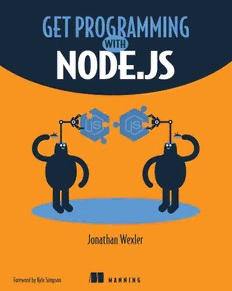Table Of ContentServer
Express.js + Middleware
Request app.use()
URL: /users/123 express.Router Defines the way requests to certain URLs are handled
Method: GET
params: {_id:123}
cookie-parser Encrypts and decrypts info about a user’s status on app
express.json Translates request contents to validate or modify data
passport Authenticates user login information during app use
Response
express-ejs-
Status: 200 Renders web page
layouts
Cookie: _j0n.W3x1eR
Content-type: text/html
EJS Mongoose.js
The EJS templating engine Mongoose is an object
transforms dynamic data and document modeling (ODM)
layouts to produce an HTML library that simplifies your inter-
page in the server’s response. action between the Node.js
server and MongoDB database.
Get Programming with Node.js
Get Programming with
Node.js
Jonathan Wexler
Foreword by Kyle Simpson
MANNING
Shelter Island
For online information and ordering of this and other Manning books, please visit
www.manning.com. The publisher offers discounts on this book when ordered in quantity. For
more information, please contact
Special Sales Department
Manning Publications Co.
20 Baldwin Road
PO Box 761
Shelter Island, NY 11964
Email: [email protected]
©2019 by Manning Publications Co. All rights reserved.
No part of this publication may be reproduced, stored in a retrieval system, or transmitted, in
any form or by means electronic, mechanical, photocopying, or otherwise, without prior
written permission of the publisher.
Many of the designations used by manufacturers and sellers to distinguish their products are
claimed as trademarks. Where those designations appear in the book, and Manning
Publications was aware of a trademark claim, the designations have been printed in initial caps
or all caps.
Recognizing the importance of preserving what has been written, it is Manning’s policy to have
the books we publish printed on acid-free paper, and we exert our best efforts to that end.
Recognizing also our responsibility to conserve the resources of our planet, Manning books are
printed on paper that is at least 15 percent recycled and processed without the use of elemental
chlorine.
Development editor: Toni Arritola
Technical development editor: John Guthrie
Review editor: Aleksandar Dragosavljević
Production editor: David Novak
Copyeditor: Kathy Simpson
Proofreader: Melody Dolab
Senior technical proofreader: Srihari Sriharan
Technical proofreader: German Frigerio
Typesetter: Dottie Marsico
Cover designer: Monica Kamsvaag
Manning Publications Co.
20 Baldwin Road
PO Box 761
Shelter Island, NY 11964
ISBN 9781617294747
Printed in the United States of America
1 2 3 4 5 6 7 8 9 10 – SP – 24 23 22 21 20 19
To the ones who got me programming and to my parents
(the two people I always know aren’t reading my book),
with love.
Contents
Foreword xv
Preface xvii
Acknowledgments xix
About this book xxi
About the author xxix
Unit 0
GETTING SET UP 1
Lesson 0 Setting up Node.js and the JavaScript engine 3
What you’re going to learn 3
Understanding Node.js 5
Why learn to develop in Node.js? 9
Preparing yourself for this book 10
Summary 11
Lesson 1 Configuring your environment 12
Installing Node.js 12
Installing a text editor 16
Setting up SCM and deployment tools 17
Working with the Node.js REPL in terminal 19
Summary 21
Lesson 2 Running a Node.js application 22
Creating a JavaScript file 23
Running your JavaScript file with Node.js 24
Running individual JavaScript commands 25
Summary 27
vii
viii Contents
Unit 1
GETTING STARTED WITH NODE.JS 29
Lesson 3 Creating a Node.js module 31
Running npm commands 33
Initializing a Node.js application 35
Summary 39
Lesson 4 Building a simple web server in Node.js 40
Understanding web servers 41
Initializing the application with npm 43
Coding the application 43
Running the application 47
Summary 48
Lesson 5 Handling incoming data 49
Reworking your server code 50
Analyzing request data 51
Adding routes to a web application 55
Summary 58
Lesson 6 Writing better routes and serving external files 59
Serving static files with the fs module 60
Serving assets 64
Moving your routes to another file 67
Summary 72
Lesson 7 Capstone: Creating your first web application 73
Initializing the application 74
Understanding application directory structure 75
Creating main.js and router.js 76
Creating views 79
Adding assets 80
Creating routes 81
Summary 83
Unit 2
EASIER WEB DEVELOPMENT WITH EXPRESS.JS 85
Lesson 8 Setting up an app with Express.js 87
Installing the Express.js package 88
Building your first Express.js application 90

